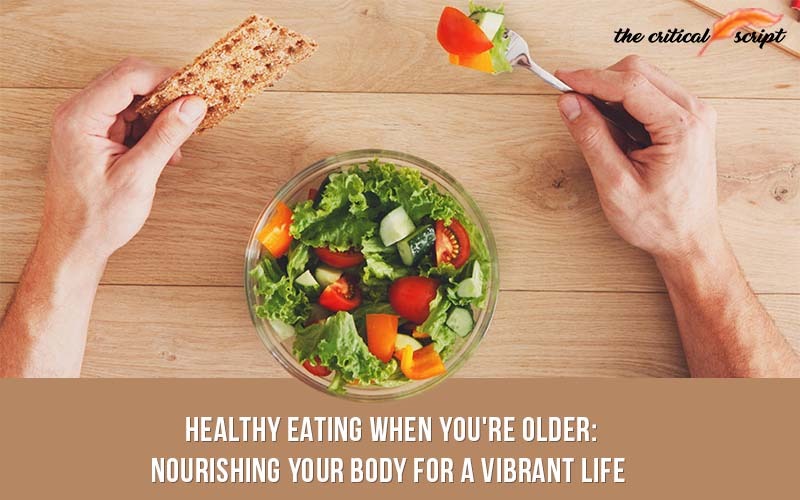
Healthy Eating When You're Older: Nourishing Your Body for a Vibrant Life
As we age, our bodies undergo various changes that necessitate a shift towards a healthier lifestyle. One of the most crucial aspects of maintaining well-being in our later years is adopting a nutritious diet. Eating well becomes increasingly important as it can enhance our energy levels, support our immune system, and reduce the risk of age-related diseases. In this blog post, we will explore the key principles of healthy eating for older adults and provide practical tips to help you make informed choices for a vibrant and fulfilling life.
Prioritize Nutrient-Dense Foods:
As we age, our bodies require fewer calories, but it becomes even more vital to consume foods that are rich in essential nutrients. One must focus on incorporating nutrient-dense foods into their diet, such as fruits, vegetables, whole grains,and healthy fats. These foods provide a wide range of vitamins, minerals, and antioxidants necessary for maintaining optimal health.
Staying Hydrated:
It is crucial to stay mindful of our hydration levels as our sense of thirst may diminish as we age. One must aim to drink at least eight glasses of water per day and include hydrating foods like soups, fruits, and vegetables in their diet. Staying adequately hydrated aids digestion, joint health, and cognitive function.
Embrace a Balanced Plate:
Adopting a balanced approach to one's meals ensures one receives a variety of nutrients.So,fill half your plate with colorful fruits and vegetables, one-quarter with whole grains, and one-quarter with lean proteins. This composition promotes healthy digestion, regulates blood sugar levels, and helps manage weight.
Reduce Sodium Intake:
High sodium consumption can lead to increased blood pressure and other health complications. Limit your intake of processed foods, canned soups, and salty snacks. Instead, use herbs, spices, and lemon juice to add flavor to your meals. Opt for fresh, whole foods whenever possible.
Include Adequate Fiber:
Fiber is essential for maintaining digestive health and preventing constipation, a common concern among older adults. Consume fiber-rich foods such as whole grains, legumes, fruits, and vegetables. Gradually increase your fiber intake to avoid digestive discomfort.
Be Mindful of Calcium and Vitamin D:
Aging increases the risk of osteoporosis and bone-related issues. Ensure an adequate intake of calcium-rich foods like dairy products, leafy greens, and fortified plant-based alternatives. Additionally, get sufficient sunlight exposure or consider vitamin D supplements to support calcium absorption.
Opt for Healthy Fats:
Incorporate healthy fats into your diet, such as avocados, nuts, seeds, and olive oil. These fats provide essential nutrients, promote brain health, and help reduce the risk of heart disease. Limit saturated and trans fats found in processed foods and fried items.
Modify Eating Habits:
Eating slowly and mindfully can enhance digestion and promote a sense of satiety. Additionally, consider smaller, more frequent meals if you have a reduced appetite or difficulty eating larger portions. Consult a healthcare professional if you experience persistent appetite changes or unintended weight loss.
Making informed choices about your diet is crucial for maintaining good health as you age. Embrace nutrient-dense foods, a balanced plate, and adequate hydration to support your overall well-being. Remember to consult with a healthcare professional or registered dietitian for personalized advice tailored to your specific needs. By nourishing your body with a healthy eating regimen, you can enjoy a vibrant and fulfilling life well into your golden years.
Disclaimer: The opinions expressed in this article are those of the author's. They do not purport to reflect the opinions or views of The Critical Script or its editor.

Newsletter!!!
Subscribe to our weekly Newsletter and stay tuned.

















Related Comments